As Part One ended, I was joining the Mondale advance staff…
Mondale Campaign Advance: With some remarkable efficiency, a large advance staff was assembled. Some were full-time and paid, but many were like me, part-time volunteers. We started getting paperwork to get up to speed. I saw that the roster included some fellow Kansas Citians – Mike Kelley, Dale Leibach and Russ Welsh. Mike Kelley was not new to a VP race. Mike was Tom Eagleton’s press secretary for seven years, including being in the middle of the chaotic 18-day VP run with McGovern in 1972 (Gene Godley had also been at Eagleton’s side during those 18 days). I had not previously known Dale Leibach, but soon met him when we joined lead advance Debbie Sale on one of my early assignments (Davenport, Iowa). I knew Russ Welsh, and we would end up at the same law firm a few years later – I joined Polsinelli in 1979 and Russ came in 1986.
As head of advance, Gene Godley sent out a manual and memos that included cautionary tales of common issues that might arise. One memo had this lofty job description of an advance person: “the conductor who leads the campaign orchestra.” From the inside, it was a lot more frantic than that. The truth was closer to the warning at the beginning of the advance manual: Murphy’s Law applies. So be ready because things will go wrong…at the worst possible moment…in the worst possible way. If everything is going right, you have overlooked something.

The advance team, usually two or three people, hit town about three days before the candidate. We were to coordinate with the local politicos, union leaders, police, press, secret service, volunteers, etc. We had to be campaign diplomats, doing our best to satisfy all the local interests while doing our main job of promoting Mondale. There was an endless list of details: motorcades, venues, sound and lighting, press credentials, meals, phone service and a hundred other things. If the entourage from the plane was staying overnight, the list expanded to baggage, room assignments and what brand of pop to have in the candidate’s hotel refrigerator.
And remember, this was done without cellphones and the internet. It took several minutes per page just to get a telecopy of the schedule over the phone. We used walkie-talkies to keep in contact during the events. Sounds primitive now, but somehow it worked.
I found that Mondale had another attribute in common with Eagleton. They both attracted the best and the brightest. This was evident from my fellow advance men and women to the senior staff who traveled with Mondale. The hierarchy included Jim Johnson, Mike Berman and Richard Moe, all of whom had been in Minnesota politics and with Mondale for years. Unbeknownst to them (I think), the advance staff referred to them as Larry, Curly and Moe. Johnson was Larry, the voice of reason; Berman had Curly’s hairline; and Moe was, well, Moe. All in jest – they were great. The press side was likewise top notch – Al Eisele and Maxine Isaacs.
Mondale’s campaign trail schedule emphasized union towns and other heavily Democratic areas where it was important to get out the vote. For me this meant Flint, Davenport, Cleveland, Akron and Sioux City. In addition to stirring up interest among the activists, we always worked to broaden the appeal with good coverage by the papers and TV. One of my favorites was this coverage on the front page of the Sioux City Journal:
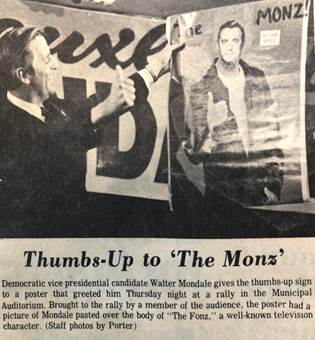
We also kept our eyes on the national news, and the campaign received a welcome boost in the October 15 VP debate between Mondale and Gerald Ford’s running mate Bob Dole. Jim Symington happened to be in Kansas City, and I watched the debate with him at his hotel. We could not believe it when Dole tried to paint the World Wars and the Korean War as “Democrat wars.” We cheered when Mondale came back hard, saying Dole had “richly earned his reputation as a hatchet man” by implying that there “was a partisan difference over our involvement in the war to fight Nazi Germany” and that it “was only partisanship that got us into the war in Korea.”
My last stop was in Gary, Indiana, on the Monday before election day. We worked with Mayor Richard Hatcher and his staff on an afternoon airport rally that was primarily designed to capture election eve coverage on nearby Chicago area TV stations. Mondale came off the plane, spoke to the crowd, sat for interviews with the press, and then reboarded to head to Detroit for another last-minute flurry of coverage.
Soon after Mondale left Gary, I hopped on a plane to Minneapolis where staffers were gathering for an election eve party. Most also stayed over for election night, but I left in the morning to return to Kansas City to celebrate the Carter/Mondale victory with the Jackson County Democratic Committee. The Committee headquarters had been left in the capable hands of Woody Overton who had worked with me on the Symington primary campaign. With the general election over, Woody was out of a job, but not for long. His hard work had been noticed, and the Eagleton staff came calling. Woody joined the Kansas City office where he served until Eagleton retired ten years later.
January, 1977 – The Inaugural: A nice thank you for our advance work was an invite to the Inaugural and specifically to a Mondale staff party and the VP Inaugural Ball.
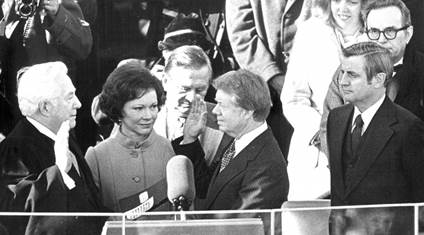
After the election, many of the advance staff ended up with DC jobs, several in the West Wing. Having no interest in leaving KC, I just assumed that would be the end of my national political work. But then I got a letter from Bill Roberts saying that he and Debbie Sale were heading up the advance office for the VP. They would have only a skeletal crew in-house and were looking for experienced hands to work on an occasional basis. I happily volunteered.
April, 1977 – Ames, Iowa: This was my first advance assignment for Walter Mondale as Vice President. It was also the first time I would work with Jim Terman, one of the elite members of Mondale advance (he later advanced the Pope in Jim’s hometown of Chicago). We had two fund-raising events on behalf of Senator Dick Clark, both being held on the campus of Iowa State. There was a smaller reception in one building and then a dinner in the Hilton Coliseum.
I pause here to talk about advance preparation. The Hilton Coliseum is a cavernous arena with a maze of hallways, floors, ramps, etc. We had done walkthroughs in advance to get the best route that also satisfied the secret service for security purposes. I was attuned to one thing that every advance person must know for every leg of a trip: where are the restrooms? Since we would be walking from the reception to the dinner, I checked out the maze in the Coliseum and found what I needed – just through a door along our route was an adjoining hallway to nearby restrooms. Now back to the story.
The VP entourage left the reception, walked a short distance to the coliseum and into the hallways to get to the arena floor for the dinner. The Vice President asked to stop at a restroom. I was of course prepared and escorted him to the door that led to the promised land. It was locked. We could not get there. Unknown to me, the secret service had the arena staff lock the door for security. Murphy’s Law had struck. Mondale looked at me and said “I’ll hold it.” And he did. I don’t remember anything else about this trip.
May, 1977 – Humphrey and Truman: I was still County Committee Chairman and had the good fortune to be one of the hosts for Hubert Humphrey when he came to Independence to accept the “Harry S. Truman Award for Public Service.” I drove him from his hotel to the Truman Library where Mike White and I posed with Senators Humphrey and Eagleton. Two weeks later, I headed to Chicago to advance a stop for Humphrey’s protégé Walter Mondale. Eight months later, Hubert Humphrey died at age 66. He left quite a legacy.
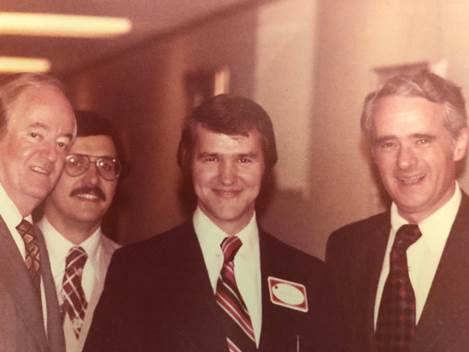
[Humphrey’s widow Muriel was appointed to complete her husband’s term. When I ended my time as County Committee Chairman in 1978, Tom Eagleton gave me a copy of Hubert Humphrey’s autobiography. He had it personally inscribed to me by Senator Muriel Humphrey.]
May, 1977 – Chicago: The restroom faux pas in Ames was apparently forgiven. The next month, I was lead advance for a trip to Chicago. Richard Daley had been mayor since 1955, but died in office in December of 1976. Daley had also been chair of the Cook County Democratic Committee, the backbone of machine politics in Chicago. Mondale was coming in to be the main speaker at the annual fundraising dinner that was previously ruled by Boss Daley. But now there was a new playing field and the power was split – Michael Bilandic was the new mayor and George Dunne was chair of the County Committee. And in the wings was powerful Congressman Dan Rostenkowski.
I was mostly working with Bill Roberts (Advance) and Becky McGowan (Scheduling) in the VP office, but others from the national staff weighed in on two sensitive items not on the usual checklists. The Chicago leaders had tried to get President Carter to the dinner and were not so happy they “only” got Mondale. George Dunne was quoted in the paper as saying there was no rancor about Carter not coming, and then, “I just feel like I used to when I asked a woman for a date and she turned me down.” Tough crowd. So we had to be extra nice.
The other issue was to balance the treatment of the players in the new power structure, being careful to not slight any faction. I remember a discussion with David Broder (Washington Post) in the press room about how all this would play out without Boss Daley in charge. I got some good help on this from Jim Terman, my fellow advance person from the Ames trip. Jim lived in Chicago and knew the politics. Also, he had once been on the staff of Senator Adlai Stevenson III and recruited several Stevenson staffers who proved invaluable on the logistics and press contacts.
The dinner was famous for being way too long. No surprise since the tiered head tables held some 120 people, and the 7,000 plus crowd occupied nine ballrooms connected by closed circuit TV. Mondale planned to stay in his hotel room while waiting to give his speech, keeping up with the festivities on the closed circuit feed. At least that is how it was advanced.
When Mondale arrived on Air Force II, I led him down the ramp to meet several dignitaries. He was then to ride to the hotel with Mayor Bilandic and Chairman Dunne. Congressman Rostenkowski, who had flown in on Air Force II, bulled his way into the limo and squeezed in next to Mondale. He had an agenda. He had heard that Mondale did not intend to sit through the whole dinner. He insisted that this be changed. The Congressman and Murphy’s Law won. A long night for the Vice President, listening to many speeches and introductions, plus touring all nine ballrooms. I have blocked out how many hours it took. Below, Mondale with Dunne (center) and Bilandic.
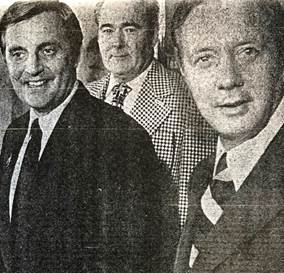
June, 1977 – San Francisco: Another memorable trip in 1977 was San Francisco which was a mix of good and not-so-good. The good was working with Bill Graham and his staff on a big time fundraiser. I knew of Graham through his reputation as one of the biggest rock ‘n’ roll concert promoters in the country. His guest list included the likes of attorney Melvin Belli and Mayor George Moscone. Our contact person for the fundraiser was Nancy Pelosi, a California member of the Democratic National Committee, ten years away from being elected to Congress.
Mondale’s San Francisco agenda included a speech to the World Affairs Council where he emphasized the Carter administration’s commitment to human rights around the globe. Human rights also became an issue later in the day, but that was because of Murphy’s Law, not our advance plan.
Mayor Moscone and a local Democratic club hosted a reception at the Hall of Flowers in Golden Gate Park. We had no say in the event forum or setup. There was a nominal entry fee, a suggested $5 donation. Some five hundred members of the gay community massed outside the building. Many also paid their $5 and came into the event. During Mondale’s talk, he was interrupted with shouts like “When are you going to speak out for gay rights?” The headlines the next day were brutal. “Veep’s talk on rights ducks gays” and “Gay Protest Harasses Mondale.” I longed for the days of the “Monz” on the front page.
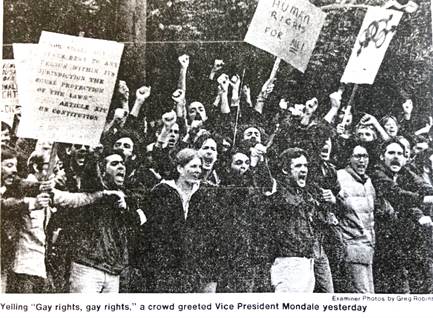
David Broder was at the event, and when Mondale ran for president in 1984, Broder harkened back to that evening in an article in the Post: “I remember a trip Mr. Mondale made to San Francisco when he was vice president. In the middle of his rally, a group of homosexuals came on to the stage and began heckling. Mr. Mondale fled so fast reporters almost missed the motorcade.” Fast is right. Many of the protestors started slow dancing on the stage as Mondale exited. We quickly arranged an impromptu dinner at Scoma’s on Fisherman’s Wharf. I’d like to say I had dinner there with the Vice President and Mayor Moscone, but I was actually at the adjacent staff table. In November of 1978, Mayor Moscone and Councilman Harvey Milk were assassinated at City Hall.
1977 – Washington, D.C.: In 1977, my teenagers Brian and Stacey joined me for a D.C. trip. Director of Mondale advance Bill Roberts gave us a VIP tour of the White House and West Wing, including some time in the Oval Office (no one in). Over at the Capitol, we had lunch with Senator Eagleton in the Senate dining room – to this day, Brian remembers having the spaghetti. Eagleton then took us up to the gallery and spent considerable time explaining what was going on in the open session.
May, 1978 – Bangkok: I was 36 years old. Had never flown across an ocean. Did not have a passport. So it was pretty cool when I got the call to advance Bangkok. The rest of the team would be lead advance Debbie Sale, my mentor from the Davenport campaign stop, and New York attorney Howard Druckman. I quickly got a passport and left North America for the first time. After stopping a couple of days in Hong Kong, I arrived for a 10-day stay in Bangkok.
International advance meant a different set of players and protocol. Our base of operation was the U. S. Embassy where a talented staff helped with every detail of the trip. My primary contact was a savvy young embassy officer named Hank Hendrickson who always seemed to know exactly what to do, logistically and diplomatically. In addition to a flurry of meetings, we were treated to social gatherings at the homes of embassy officials.
We learned to allow plenty of time to get to meetings because the traffic of Bangkok was in perpetual gridlock. One of our regular destinations was the Thai protocol office where we considered thousands of details. Then reconsidered. Then often changed at the last minute. Everyone wanted everything to go right. And except for the crazy motorcades in Bangkok traffic, it mostly did.
Mondale’s two day visit started with an official welcome at the airport by the Prime Minister and other officials. Full military honor guard and a 19-gun salute. Anthems played. Thai women dropped flower petals in Mondale’s path as he walked to the reception area.
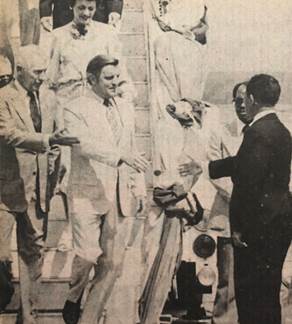
While in Bangkok, Mondale signed an economic aid agreement, held meetings with the Prime Minister, met the King and Queen at the Grand Palace and attended a state dinner featuring Thai classical dancing.
There was also an important visit to the Din Daeng Refugee Center (photo below). Thousands of refugees from Laos, Cambodia and Vietnam were in Thai refugee camps. Resettlement of the refugees (many known as the “boat people”) was a critical international issue after the end of the Vietnam War. In July of the following year, Mondale addressed the problem in a speech at the Geneva Meeting on Refugees and Displaced Persons in South-East Asia. He reminded his audience that in 1938 a similar international meeting failed to welcome refugees (i.e., Jews in Nazi Germany). His speech was credited with galvanizing the support that led to many nations agreeing to accept refugees.
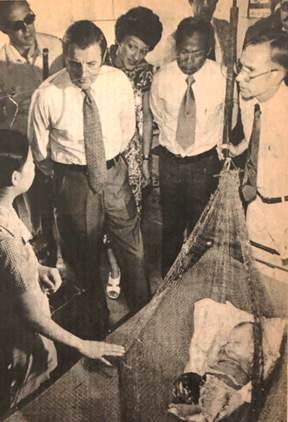
[Refugee Update: Last week, on July 23, 2019, elder statesman Walter Mondale (at age 91) wrote an op-ed for the Washington Post. The subject: the current humanitarian crises related to Central American refugees. The issue: the contrast of then and now. In 1979, there was bipartisan support led by the United States to welcome refugees, saving thousands of lives. In 2019, the door is being closed. He echoed his statement from 1979: “History will not forgive us if we fail. History will not forget us if we succeed.”]
One of my tasks in Bangkok was advancing Joan Mondale when she had events separate from the VP. This included a river cruise and a tour of the vast Grand Palace complex. Below, Mrs. Mondale with her advance guy.
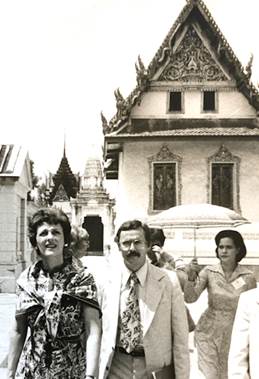
At the end of the trip, there was a closing ceremony at the airport…in the pouring rain. Howard Druckman got the ultimate advance man photo in the Bangkok Post the next day – protecting the VP from the elements.
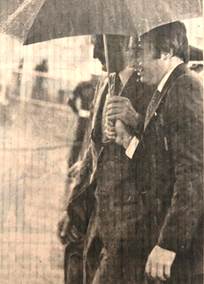
After Bangkok, I took some personal time to circle the globe, stopping in Katmandu, Agra (Taj Mahal), Israel, Cairo and Athens. I sent a post card to Rita from Tel Aviv, saying that I had found a new passion – international travel – and I was looking forward to someday taking her around the world. I will revisit this comment in Part Three.
Also coming in Part Three: Mondale advance for the 1978 Midterms, Helsinki and Lagos; Tom Eagleton’s 1980 race for his third term.